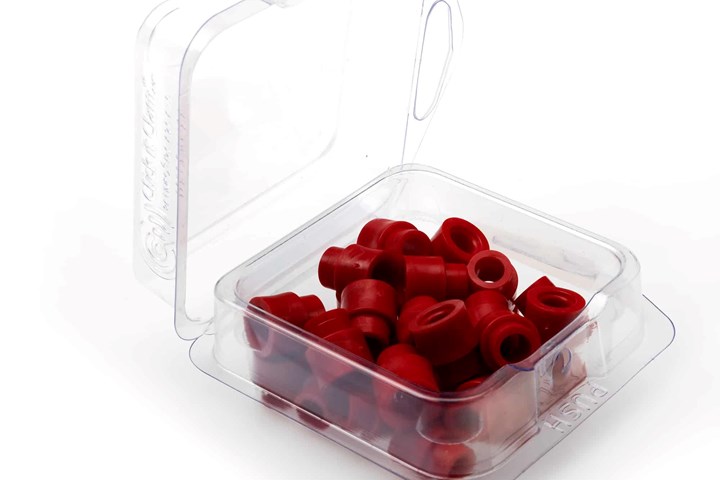Intrinsic Viscosity Enhancer for rPET and PET Food-Contact Applications
Nexam’s Nexamite MO2100 rebuilds molecular weight and increases IV to enable upcycling of rPET.

A new intrinsic viscosity (IV) enhancer additive masterbatch for PET and rPET from Sweden’s Nexam Chemical, which develops, produces and sells additives to the global plastics industry, has been approved for food-contact applications in both Europe and the U.S. Nexamite M021200 has been shown to rebuild molecular weight of rPET, enabling the upcycling of low IV rPET from thermoformed trays or fibers to higher IV rPET.
Nexam’s reactive recycling additives technology for PET recently received a first production order for thermoformed food packaging. Since the beginning of 2022, Nexam has worked in a project with an Israeli food packaging manufacturer with the goal of increasing the amount of recycled PET in their thermoformed products. Nexam's additive has been shown to enable the use of a larger amount of rPET in the packaging than would otherwise have been possible. The product is now fully developed and technically approved. Reactive recycling is a molecular tool, through the use of additives, that simplifies and improves today's recycling by improving lost properties.
The new additive masterbatch has been shown to enable use of higher concentrations of rPET in the packaging product as well as sourcing and use of alternative sources of rPET with lower IV. Reduced brittleness, increased melt strength for most stable processing and faster throughput and improved mechanical properties are also touted.
According to Nexam’s CEO Ronnie Törnqvist, additives designed to reduce molecular weight of PP by vis-breaking have long been commercially available. Nexam’s technology increases molecular weight by reactive extrusion of rPP and Nexam’s additive, which address reduced molecular weight loss during degradation, thereby increasing the melt flow rate (MFR). "We see an increasing interest in our products in this type of application and we have several ongoing projects in Europe. This type of food packaging, together with our additives in recycled PET for fiber, are two areas with great potential. Our additives open the door for the majority of actors to use recycled plastic at a low cost in the manufacture of products that are aimed at areas with higher demands on both quality and durability. In this case, food packaging.”
Related Content
-
Improving Twin-Screw Compounding of Reinforced Polyolefins
Compounders face a number of processing challenges when incorporating a high loading of low-bulk-density mineral filler into polyolefins. Here are some possible solutions.
-
First Quarter Looks Mostly Flat for Resin Prices
Temporary upward blips don't indicate any sustained movement in the near term.
-
Prices for PE, PS, PVC, PET Trending Flat; PP to Drop
Despite price increase nominations going into second quarter, it appeared there was potential for generally flat pricing with the exception of a major downward correction for PP.












